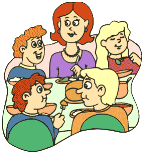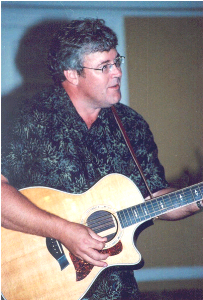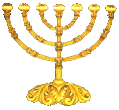Ministry
3
Worship God and Celebrate the Lord’s
Supper
Learner
is teaching in his home when Mr. Foolish and others in the
congregation fall asleep. He sees two young people eating something
during the Lord’ Supper. The children look around restlessly.
His wife Sara tells him afterwards, “I heard some of them
talking when they did not know I was there. They argued about whom
they should follow, Mr. Wise, Helper or you. One said to follow Mr.
Foolish. An adolescent told another, ‘It is boring. Learner
always does everything, and it is always the same. It is a ritual
that we do without thinking. That is why I brought something to
eat!’”
 Learner
writes to Mr. Wise to explain what is happening. Mr. Wise sends this
message back for Learner to read to the congregation, “My dear
brothers and sisters. I must say the same thing to you that the
apostle Paul said to the Corinthians in 1 Corinthians 11:17-34. It
sounds like some of you are doing more harm than good when you meet
together. There are divisions among you. It is not the Lord’s
Supper you are concerned about when you come together. Some of you
eat during the Communion service, in front of others who are hungry.
Do you not have homes for eating and drinking? We sin when we
celebrate The Lord’s Supper without taking it seriously. Have
you have forgotten that God is present when you worship as a
congregation?”
Learner
writes to Mr. Wise to explain what is happening. Mr. Wise sends this
message back for Learner to read to the congregation, “My dear
brothers and sisters. I must say the same thing to you that the
apostle Paul said to the Corinthians in 1 Corinthians 11:17-34. It
sounds like some of you are doing more harm than good when you meet
together. There are divisions among you. It is not the Lord’s
Supper you are concerned about when you come together. Some of you
eat during the Communion service, in front of others who are hungry.
Do you not have homes for eating and drinking? We sin when we
celebrate The Lord’s Supper without taking it seriously. Have
you have forgotten that God is present when you worship as a
congregation?”
Exercise
Find
in 1 Corinthians 11:17-34:
-
What
were the words of Jesus when He broke bread on the night He was
betrayed?
-
Against
whom do we sin when we fail to honor the Body of Christ during the
Lord’s Supper?
-
What
do we examine before taking Communion so that we do not bring God’s
judgment on us?
Mr.
Wise' letter continues, “Before I left, I taught you how to
worship. I taught that God is present when we meet together. We
worship God with everything we do.”
Learner
says, “I recall Mr. Wise' teaching. We worship in our prayer
and praise, in teaching God’s Word, in the Lord’s Supper
with confession to God of our sins, in giving, and in our fellowship.
We do not do these things for entertainment. God gives us freedom to
do these things in different ways. Paul told the Ephesians to make
music to the Lord in our hearts with psalms, hymns and spiritual
songs. Songs can be psalms, our own words or songs written by others.
They are for giving testimony of God’s great works and thanking
Him. They are also for praising God’s greatness and adoring
Him.”
Helper
adds, “Mr. Wise also taught us how in the Old Testament God’s
people worshiped Him in special ways during their festivals. The
Passover Festival lasted seven days with a special offering on each
day and special assemblies on the first and last day. When Solomon
built God’s Temple, crowds came to Jerusalem to celebrate. They
ate together and lived in booths. They stood to listen to the
musicians singing and playing trumpets and other musical instruments.
King Solomon prayed a special prayer for them, standing and then
kneeling. Our prayers are like sweet smelling incense in the presence
of God.”
Learner
again reads from the letter, “Here are some things your leaders
can do to make your worship of God beautiful, like incense in His
presence:
-
Pray
in preparation.
-
Ask
people ahead of time to help you with different parts of the worship.
-
Help
everyone plan their part carefully beforehand.
-
Arrange
for everyone, including children, to participate in different ways.
-
Hold
festivals to celebrate special events, such as the Birth of Christ, His
Death and Resurrection.”
They
discuss these things for a few minutes, then Learner continues to
read the letter: “As the writer of Hebrews says, ‘Long
ago God spoke to our ancestors through the prophets. But now in these
final days, He has spoken through His Son, Jesus, reflects God’s
own glory, and everything about Him represents God exactly. After He
died to clean us from sin, He sat down in the place of honor at God’s
right hand in heaven. When we worship God, we honor Jesus by praying
in His name, teaching His words and proclaiming His death in the
Lord’s Supper. We take care of the needs of His body, the
congregation, through giving and fellowship.”
Several
say, “Amen!” and Learner finishes the letter:
“When
you gather to worship God together and take the Lord’s Supper,
you partake of the body and blood of Christ. You proclaim His death.
You enter into the very presence of God. If you do not realize this,
you dishonor the body and blood of Christ. The Old Testament shows us
how important the shed blood of Christ is.”
Learner
says, “Helper, please tell the story of The Passover that we
studied together, about how to enter the presence of God.”
Exercise
Find
in Exodus 12:21-42 how God freed His people from slavery in Egypt:
-
What happened after the firstborn Egyptians
died, to enable the Israelite slaves to go free?
-
How
were the Israelites to remember for all generations this liberation
from slavery?
 After
the meeting, Learner and his brother Helper study Bible passages that
Mr. Wise listed for them, about the Old Testament sanctuary and
worship. Learner asks Helper, “Please teach about it next
week.”
After
the meeting, Learner and his brother Helper study Bible passages that
Mr. Wise listed for them, about the Old Testament sanctuary and
worship. Learner asks Helper, “Please teach about it next
week.”
When
Helper begins teaching everyone pays close attention. He sings a song
that he wrote for the occasion about the blood of the Passover lamb
painted on each side of the doors. He explains, “In the Old
Testament, the Jews who loved God celebrated Passover every year.
They remembered how God used blood and the death of firstborn sons to
free them. It was an example to show us how God’s Son would
liberate us from slavery to sin with His blood. This is explained in
The Earthly Copy of the Heavenly Tabernacle in the book of Hebrews.”
Exercise
Read
Hebrews 9:1-26 to find what Helper teaches:
-
What
things were in the first, outer room of the sanctuary?
-
What
things were in the inner, most holy place?
-
What
did the High Priest do once a year to cover his own sins and the sins
of the people?
-
How
did God’s Son secure our salvation forever?
Helper asks the people, “Do you have questions?"
One
asks, “What was it like to worship in the Old Testament?”
“Mr.
Wise explained this. In ancient times, people took a lamb or a bull
when they went to worship. They laid hands on it to confess their
sins; the priests slit its throat. It was messy. The blood sacrifice
foretold the death of Jesus, whose blood atoned once forever, for all
the sins of the world. Learner, can you help me explain this?”
 Learner
adds, “The Holy Place of the Temple had a lamp stand, a table
and holy bread. Behind a curtain in the Most Holy Place there was
incense and the Ark of the Covenant. The High Priest entered there
once a year with blood to cover his sins. When Jesus died, the
curtain was ripped open, and Jesus entered God’s presence as
our High Priest. His blood takes away our sin and saves us once for
all time. Now we enter freely into God’s presence, into the
Most Holy Place, and we offer our prayers like incense to Him. We are
in the presence of Christ when we break the holy bread at the Lord’s
Table. He is present when we drink the cup of the new covenant in His
blood. He promised that when two or three are gathered in His name,
He is present.”
Learner
adds, “The Holy Place of the Temple had a lamp stand, a table
and holy bread. Behind a curtain in the Most Holy Place there was
incense and the Ark of the Covenant. The High Priest entered there
once a year with blood to cover his sins. When Jesus died, the
curtain was ripped open, and Jesus entered God’s presence as
our High Priest. His blood takes away our sin and saves us once for
all time. Now we enter freely into God’s presence, into the
Most Holy Place, and we offer our prayers like incense to Him. We are
in the presence of Christ when we break the holy bread at the Lord’s
Table. He is present when we drink the cup of the new covenant in His
blood. He promised that when two or three are gathered in His name,
He is present.”
Caregiver
says, “I understand now that I have not recognized Christ’s
body when we served the Lord’s Supper. I had forgotten that we
enter right into God’s presence when we worship together. I
think we all need to improve our attitude in worship.”
-
Learner
comments, “Paul also makes it clear in 1 Corinthians chapters 12 – 14
that one leader is not to do everything. As many as want to do so are
to take an active part in the worship in some way. From now on, I will
share my leadership responsibilities with others. I will help all of
you who want to participate more to do so.
We will all grow more and the congregation will have many more new
leaders who can start new congregations.”
Learner
turns toward Helper. “I need your help. Please help me in the
future to prepare our people better for the Lord’s Supper. And
I need the help of all the rest of you, to improve different parts of
our worship and of our other ministries. We will honor Christ by
developing these ministries. Helper, I want you to help us with the
music.” Learner assigns jobs to other people also, so that from
then on he would not be the only one who leads worship.
After
the service Learner tells Helper, “I am going to follow these
instructions for our congregation. I realize now that I became
careless. As Paul said in 1 Corinthians 11, God severely punished the
Corinthians who failed to respect the Body of Christ as they
celebrated the Lord’s Supper. They failed to remember the
terrible sacrifice that Jesus made. They failed to see that when we
meet together we are the Body of Christ. God takes this mystery very
seriously. So must everyone in your congregation. That is why Paul
warned us not to make a full meal out of the celebration, because
people become more interested in the food than in participating in
the body and blood of Christ, as 1 Corinthians 10:16-17 says.”
Practical
Work
-
Ask
those with musical ability and spiritual gifts for teaching or giving
words of wisdom to participate by leading different parts of the
worship.
-
Encourage
people to express their love for God in new and creative ways.
Encourage those with musical talent to write songs of praise to God,
using the local music style.
-
Use
the stories in this section to teach that God is present when we gather
to worship Him.
-
Plan
for everyone to participate in worship in some way, besides singing,
including the children.
Help
people who lead the different parts of worship to prepare beforehand.
Return
to top
 Learner
writes to Mr. Wise to explain what is happening. Mr. Wise sends this
message back for Learner to read to the congregation, “My dear
brothers and sisters. I must say the same thing to you that the
apostle Paul said to the Corinthians in 1 Corinthians 11:17-34. It
sounds like some of you are doing more harm than good when you meet
together. There are divisions among you. It is not the Lord’s
Supper you are concerned about when you come together. Some of you
eat during the Communion service, in front of others who are hungry.
Do you not have homes for eating and drinking? We sin when we
celebrate The Lord’s Supper without taking it seriously. Have
you have forgotten that God is present when you worship as a
congregation?”
Learner
writes to Mr. Wise to explain what is happening. Mr. Wise sends this
message back for Learner to read to the congregation, “My dear
brothers and sisters. I must say the same thing to you that the
apostle Paul said to the Corinthians in 1 Corinthians 11:17-34. It
sounds like some of you are doing more harm than good when you meet
together. There are divisions among you. It is not the Lord’s
Supper you are concerned about when you come together. Some of you
eat during the Communion service, in front of others who are hungry.
Do you not have homes for eating and drinking? We sin when we
celebrate The Lord’s Supper without taking it seriously. Have
you have forgotten that God is present when you worship as a
congregation?” After
the meeting, Learner and his brother Helper study Bible passages that
Mr. Wise listed for them, about the Old Testament sanctuary and
worship. Learner asks Helper, “Please teach about it next
week.”
After
the meeting, Learner and his brother Helper study Bible passages that
Mr. Wise listed for them, about the Old Testament sanctuary and
worship. Learner asks Helper, “Please teach about it next
week.” Learner
adds, “The Holy Place of the Temple had a lamp stand, a table
and holy bread. Behind a curtain in the Most Holy Place there was
incense and the Ark of the Covenant. The High Priest entered there
once a year with blood to cover his sins. When Jesus died, the
curtain was ripped open, and Jesus entered God’s presence as
our High Priest. His blood takes away our sin and saves us once for
all time. Now we enter freely into God’s presence, into the
Most Holy Place, and we offer our prayers like incense to Him. We are
in the presence of Christ when we break the holy bread at the Lord’s
Table. He is present when we drink the cup of the new covenant in His
blood. He promised that when two or three are gathered in His name,
He is present.”
Learner
adds, “The Holy Place of the Temple had a lamp stand, a table
and holy bread. Behind a curtain in the Most Holy Place there was
incense and the Ark of the Covenant. The High Priest entered there
once a year with blood to cover his sins. When Jesus died, the
curtain was ripped open, and Jesus entered God’s presence as
our High Priest. His blood takes away our sin and saves us once for
all time. Now we enter freely into God’s presence, into the
Most Holy Place, and we offer our prayers like incense to Him. We are
in the presence of Christ when we break the holy bread at the Lord’s
Table. He is present when we drink the cup of the new covenant in His
blood. He promised that when two or three are gathered in His name,
He is present.”